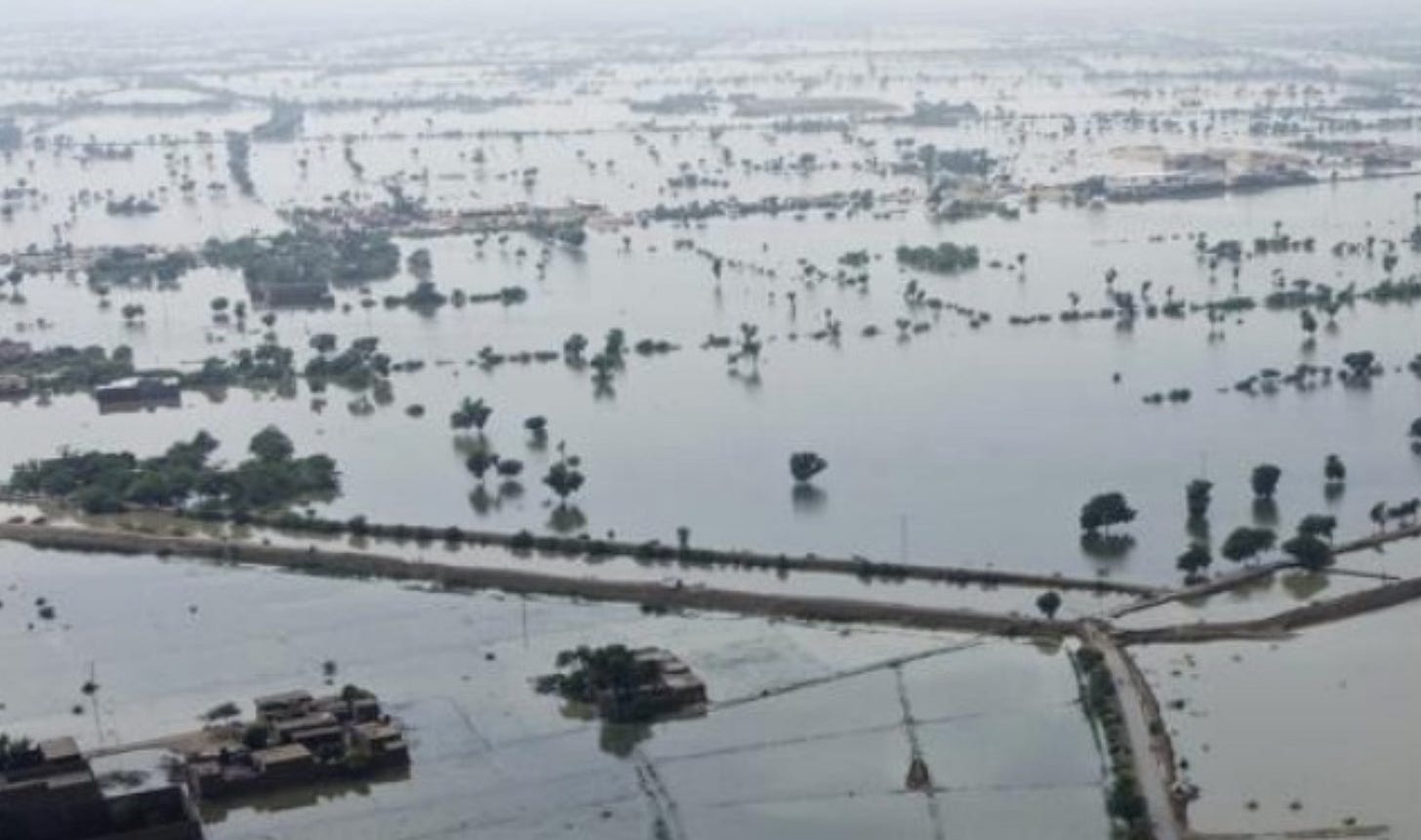This week we take a break from covering developments in Scotland to focus on events in Pakistan. I have a personal connection to the country, through my father who was born there. Having spent some time studying the unfolding disaster gripping the country, I felt unable to write about anything else.
In the tumultuous and chaotic times in which we live, we might turn to history. This can help to add context to an era which would be all too easy to get swept up in, as we move from one earth shattering event to the next. You do need some grounding. It feels lazy, and incomplete, to simply doomscroll your way towards an appraisal of the period.
Historical context is, therefore, important. It allows us to maintain a material view of things and apply a sense of proportion. It feels like we are in a kaleidoscopic period in which all elements are thrown into the mix at once. But crisis is nothing new. At many other points in history we can only imagine the atmosphere, and the extent to which people believed themselves to be living in the end times. War between the major powers, after all, remains within living memory.
The system is highly adaptable. Even periods of real destruction can be turned into a reboot mechanism. Some predicted the demise of capitalism in the aftermath of World War II. Instead, an economic boom precipitated a period of rising living standards, access to new household products such as washing machines and an array of chemical potions and plastics. In the West, consumer capitalism, baptised by a burgeoning advertising industry, sold a new and improved way to live.
Of course, it is also true that the system necessarily generates a whole series of conflicts. Today, Emanuel Macron tells us that “abundance” must come to an end to save the planet. For whom, we might ask. Economic inequality has grown as workers organisation has been dismantled. Now, green shoots of a new working class militancy are emerging. Competition between states, military expansion and war have marked the first two decades of this century. That, alas, is not going away. Far from it.
Pakistan is the crucible of the climate crisis. It has an existential quality to it that disrupts the calm application of historical context. For here, the catastrophe cannot be exaggerated. It forces us all to confront a future much closer than we might imagine, in which the world changes utterly from that which we know.
For millions, that future is now. The “end of the world” is already here. As Asghar Ali, a Pakistani farmer, puts it:
“It was not less than a doomsday for us. Thousands of people just didn’t have time to shift precious households to safe places. We saved our lives but the houses filled with floodwater. Life here on the motorway is a curse.”
Injustice on top of injustice
Pakistan accounts for around 1% of global emissions. Despite this, as with countries across the Global South, it is on the sharp end of climate breakdown. The flooding is being driven by a combination of a “monsoon on steroids” and glacial melt. The country hosts over 7000 glaciers, the most of any region on earth outside of the poles, a fact that astounds casual observers.
The flood waters deluge homes, approximately one million of which are destroyed or heavily damaged. This means that access to water, sanitation and shelter has been thrown into disarray for tens of millions of people. Eleven million children are affected. It is estimated that around 50 million people have been displaced. Infrastructure has been decimated and washed away, making the delivery of aid more difficult. Over 220 key bridges have been destroyed.
2 million acres of crops have been wrecked, alongside the deaths of over 700,000 livestock. Around 90% of cotton crops have been destroyed in the Sindh province, according to its chief minister. Calculating the human cost is almost impossible. The longterm effects of the floodwaters, which have stripped lands of the nutrients that make them arable, will lead to grave food shortages. The October wheat planting season has been written off for huge swathes of the country.
Ross Colquhoun, who I am usually at logger heads with, produced a quite astonishing graphic to give a sense of proportion and scale to the flooding. It is useful because it helps us to visualise the enormity of the emergency.
International solidarity
Pakistan was, before being submerged in water, in the midst of an economic crisis. The floods have already caused in the region go $10 Billion worth of damage, and the cost of essential items is soaring.
If you read around, you will come upon the intervention of the International Monetary Fund (IMF). It is reported that $1.16 billion has been agreed to be released to Pakistan in the wake of the floods. But the truth is far more complicated. While some articles read as if this is some kind of emergency fund, it is in fact part of a pre-existing “assistance” package. As the Financial Times reports:
“The IMF has approved the disbursement of more than $1.1bn to Pakistan, reviving a stalled $7bn assistance package expected to help stave off default despite a severe economic crunch and devastating floods. The IMF’s board in Washington authorised the expenditure after Prime Minister Shehbaz Sharif’s government introduced austerity measures, including sharply increasing domestic fuel prices.”
This is a familiar process. The IMF are imposing austerity, and energy price hikes, on Pakistan despite the crisis. Antoinette Sayeh, deputy managing director and acting chair of the IMF’s executive board, said maintaining the “reform measures” would be crucial:
“Steadfast implementation of corrective policies and reforms remains essential to regain macroeconomic stability, address imbalances and lay the foundation for inclusive and sustainable growth.”
This is word salad for saying that Pakistan is under the thumb of the IMF, who hold the whip hand on the disbursement of funds to a country in the midst of a doomsday style disaster. That, as such, the Pakistani people are to be subjected to further, ruinous, austerity without their democratic consent. This is in the nature of the institutions that run global capitalism. They are economically punitive on the one hand, and anti-democratic on the other, whether that be in Greece or Pakistan.
This has been an ongoing operation in Pakistan. The IMF has been intent on hollowing out popular sovereignty of any meaning for some time. Charting developments, Ammar Ali Jan, a historian and a member of the Haqooq-e-Khalq Movement, reports:
“The IMF is pushing Pakistan’s government to make its State Bank ‘independent’ of democratic politics through an act in Parliament. Termed the State Bank Amendment Bill, the proposed legislation purportedly aims to protect the bank from ‘political interference’ in order to ensure that the country can service debt and maintain price stability at manageable levels. Yet, the bill entails the complete erasure of the country’s economic sovereignty — with potentially disastrous consequences for working families in Pakistan.”
Over recent years, the IMF, through a so-called “structural adjustment programme” ensured that the people and infrastructure of Pakistan would be in a further state of immiseration prior to the floods. The programme dictated cuts of 40 percent of the budget to higher education, and the privatisation of the health sector. Subsidies on utilities were reduced, while increases in pubic sector pay were cancelled.
Opposition to this economic tyranny took the form of student mobilisations, farmers demonstrations, and sit-ins organised by government employees. Resistance was the subject of brutal attack, which led to the death of a farmer while leading protests. Note that the use of the state to intervene in the economy is derided, but it plays a central role when it comes to the exercise of its repressive functions to pave the way for the demands of the IMF.
Ammar Ali Jan further reflects:
“The repression highlighted a new normal in which decisions imposed by technocrats would not only be rubber-stamped by elected governments but would also have the violent backing of the coercive state machine.”
We often hear about the “internationalism” of the likes of the IMF. But it is nothing of the sort. We should support charities and other organisations who are delivering aid on the ground. But we should also be on the side of the Pakistani workers, students, environmentalists and farmers who have been on the front line when it comes to opposing the ruination visited upon them by the institutions, and who are now staring the climate emergency in the face.
As I argued in a recent Herald column focussed on the question of class and climate change:
“…there must be a democratic solution. Resources must be managed in a way that responds to the needs of society at large, not just the 1%. Technology must serve to liberate us all, rather than becoming another tool to enforce elite rule. Planetary-wide solidarity must find popular expression beyond the institutions that manage transnational capitalism.”
COP26 might never have happened. It is an irrelevance to the events now rapidly unfolding. It can only be described as a failure in the most absolute terms.
That while Pakistanis are up to their knees in mud and water, they are being economically crippled, cannot stand. That the country produces a percentage point worth of global emissions, is now subject to the melting of the beautiful glaciers it hosts, is a case study in the injustice at the core of the climate breakdown.
My call is for Scottish solidarity with Pakistan.
A solidarity that will be open enough to include the broadest possible support for the Pakistani people, but radical enough to expose the bankruptcy of the system.









I had no idea as to the extent of the flooding - thanks for the graphic. Mainstream media failed in this - no doubt because the sheer size of the flooding is chilling. Also the IMF/World Bank are evil...nuff said methinks (i mean who is in favour of evil ffs lol)